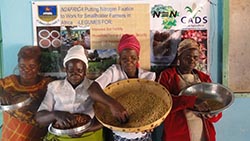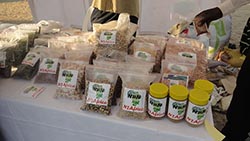After eight good years of working with thousands of smallholder farmers across seven districts during Phase I and five districts during Phase II, N2Africa Zimbabwe is now wrapping up the active funding phase of the project. In Zimbabwe, we are entering ‘Phase III’ in which farmers and our N2Africa partners will continue to reap the benefits of N2Africa technologies and approaches. Throughout the last eight years, N2Africa closely collaborated with the Cluster Agricultural Development Services (CADS), a local NGO that has used truly inspiring approaches, taking farmers through essential steps from production to local consumption and marketing. AGRITEX, the Government Department of Agriculture and other technical and extension services provided an extensive network and thereby a unique vehicle for taking N2Africa technologies to scale. Collaborating with the Soil Productivity Research Lab (SPRL) inoculant factory ensured that the quality of inoculants delivered to the farming community remained impeccable. For all this, we in Zimbabwe are truly grateful to our partners. Below, we highlight the nodes that are pillars to continued project ripple effects beyond December 2017!
Access to inputs to drive future sustainable production
Zimbabwe’s economy has a huge agrarian inclination. This is one of the reasons why the SPRL has been continuously supported by governments since the 1960s to ensure that the country has sufficient inoculants. N2Africa has supplied some critical equipment to the laboratory and gave opportunities to local staff for training on current inoculant technology practices. The direct and mutual relationships that SPRL and seed companies have natured over the past few years are likely to fuel sustainability. Independent technology dissemination by partners, especially through demonstration trials by seed companies will continue in different farming communities.
Markets and processing
Smallholder farmers have often failed to access large scale buyers, such Olivine Industries in Harare, due to small volumes per transaction that are associated with large transaction costs. Training in collective marketing and the formation of viable community marketing associations have removed this bottle neck. Organization of training activities on collective action was anchored at the local level, a necessary recipe for sustainability.

|

|
Technology dissemination and partnerships
Beginning from January 2016, the N2Africa team in Zimbabwe sought to place extension and other stakeholders at the forefront, with the role of core project staff limited to technical backstopping. The project sought to reach new farmers using fellow farmers as new ‘experts’ for technology dissemination. These successful farmers became hotspots for local dissemination of technologies into the future. We actively ensured that district-level extension planning mainstreamed grain legume production, including a dedicated session on grain legumes at ward and district-level agricultural shows. The confidence-building measures we adopted in working with local partners are part of our vision for sustained use of technologies before the active N2Africa project period. While the University of Zimbabwe has been leading the project during Phase II, it important to highlight that the university is a local institution that will continue research and dissemination activities as most of the research is done on-farm. Through N2Africa, a lot of interest on grain legumes has been created among faculty and graduate and undergraduate students. This is the greatest hope we have – enhanced human capacity is the gateway to the future!
Success story
Lately, we have basked in glory as we marvelled at the demonstrated skills and knowledge by N2Africa farmer groups as they were fervently marketing their own produce at the annual Harare Food Fare. We indeed met some important components of this project –from production, to marketing to consumption! The grain legumes story has been hidden in smallholder farmers’ hearts through N2Africa- the message has been cast in stone!
The N2Africa Project Zimbabwe Exit Strategy report is available here.
Regis Chikowo, Country Coordinator Zimbabwe
